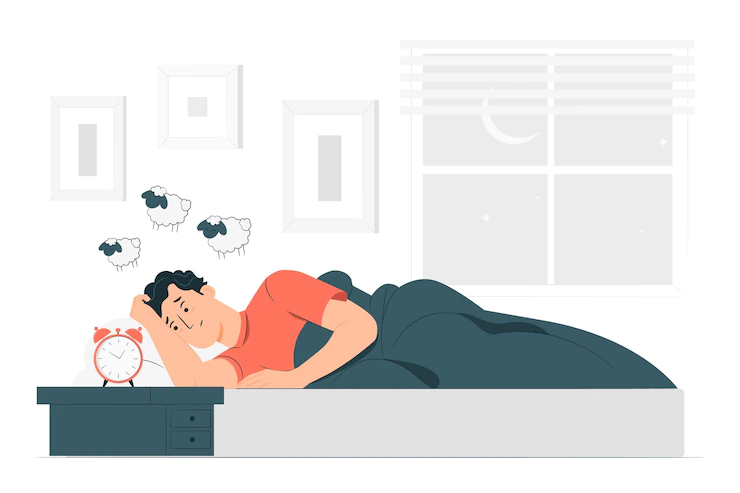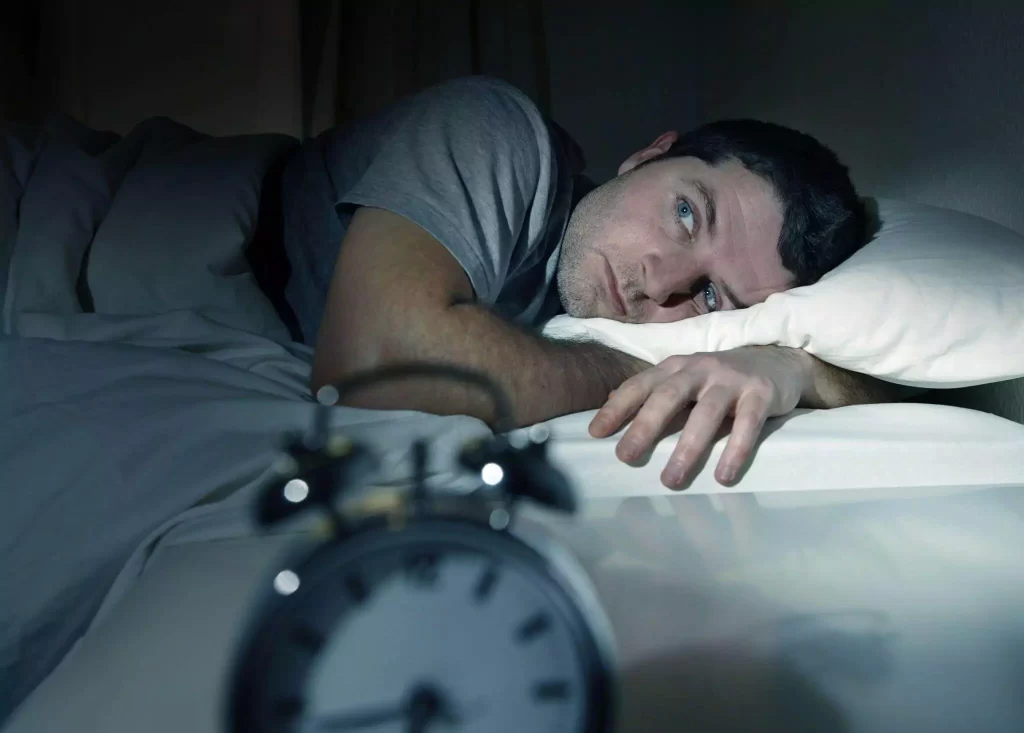Insomnia
Poor Sleep: What Is It And What Are The Causes Of Poor Sleep
We all know that sleep is essential to our daily lives. It helps us recharge, learn and grow. And when we don’t get enough, the consequences can be staggering: people who sleep less than six hours per night are more likely to develop a host of cognitive difficulties, including impaired judgment and short-term memory. But what can you do to improve the quality of your sleep? Dreadnot asks one expert and breaks it down for you in this post

Poor Sleep is crucial for our bodies and brains to continue functioning properly. When we don’t get enough sleep our physical body takes the brunt of the consequences with increased risk of injuries, disrupted metabolism and lower immunity which makes us more susceptible to illness and infection. One of the main causes for lack of sleep can be attributed to insomnia – trouble falling or staying asleep, night waking and overall poor quality of sleep. Here are some tips to combat sleeplessness –
If you’re not sleeping, you’re not living. Good sleep provides a host of functions, such as lowering the risk of developing diabetes and controlling depression. Research shows that virtually everyone wants to get better sleep but find it hard. Seventy-five percent of Americans suffer from binge sleeping (more than 10 hours in a day) and only 33% are getting enough quality sleep. Today we will be mentioning some written articles on gentle practices to improve Poor sleep.
The Importance of Sleep
Sleep is critical for our physical and mental health. It allows our bodies to repair and rejuvenate, and it gives our brains the time they need to process information and consolidate memories. According to the National Institutes of Health, adults need 7-8 hours of sleep per nigh
There are a number of things we can do to improve the quality of our sleep. First, we need to create a dark, quiet, and cool environment in which to sleep. This means eliminating sources of light and noise, and making sure the room temperature is comfortable. Second, we need to establish a regular sleep schedule by going to bed and waking up at the same time each day.
Third, we need to avoid caffeine and alcohol before bedtime, as these substances can interfere with sleep. Fourth, we need to exercise regularly, as this can help improve sleep quality. Finally, we need to relax before bedtime by reading or taking a bath. By following these tips, we can improve our sleep quality and get the rest our bodies and minds need!
What is poor sleep?
Most people know what it feels like to have poor sleep. You feel tired during the day, you may have trouble concentrating, and you may even feel cranky or irritable. Poor sleep can lead to more serious problems, such as depression, anxiety, and chronic fatigue.
There are many different causes of poor sleep. One of the most common is stress. When you’re stressed, your body releases cortisol, a hormone that makes you feel alert and awake. This is fine if you’re dealing with an emergency, but if you’re trying to sleep, it can keep you up all night.
Poor sleep can also be caused by medical conditions like insomnia or sleep apnea. Insomnia is a condition that makes it hard to fall asleep or stay asleep. Sleep apnea is a condition where your breathing stops and starts while you’re asleep. Both of these conditions can make it hard to get the restful sleep your body needs.
If you think you might be suffering from poor sleep, talk to your doctor. They can help you figure out what’s causing your sleeplessness and how to treat it so you can get the restful night’s sleep you need.

The Causes of Poor Sleep
There are many different causes of poor sleep. Some people may have difficulty falling asleep because of anxiety or stress. Others may have medical conditions that make it difficult to Poor sleep. Some medications can also cause poor sleep.
People with insomnia often have trouble staying asleep. This may be due to an underlying medical condition, taking certain medications, or experiencing stress or anxiety. Insomnia can also be caused by bad sleep habits, such as sleeping in an uncomfortable environment or using electronic devices before bedtime.
Shift workers may also experience poor sleep due to their work schedule. People who work at night or on rotating shifts often have difficulty sleeping during the day because their body is not used to the change in schedule. This can lead to insomnia and other Poor sleep disorders.
How to improve sleep quality
If you’re not getting enough sleep, or if the quality of your sleep is poor, it can have a major impact on your overall health and well-being. There are a number of things you can do to improve the quality of your sleep, including:
- Establish a regular sleep schedule and stick to it as much as possible.
- Create a relaxing bedtime routine and avoid watching television or working on the computer in the hours leading up to sleep.
- Keep your bedroom dark, quiet, and cool.
- Reserve the bed for sleep and sex and create an environment that promotes relaxation.
- Limit caffeine intake, especially in the afternoon and evening hours
- Avoid alcohol before bedtime.
- Get regular exercise, but avoid strenuous activity in the hours before bedtime.
Additional Tips
There are a number of things you can do to improve your sleep hygiene and quality of sleep, including:
• Establishing a regular sleep schedule and sticking to it as much as possible. This means going to bed and waking up at the same time each day, even on weekends.
• Creating a calm and comfortable sleeping environment, free from noise, light, and other distractions.
• Avoiding caffeine and alcohol before bedtime.
• avoiding work-related or other stressful activities in the hours leading up to sleep.
• Practicing relaxation techniques such as deep breathing or progressive muscle relaxation before bedtime.

Homegrown Solutions to Improve Poor Sleep Quality
If you’re one of the millions of Americans struggling to get a good night’s sleep, don’t despair. There are many things you can do to improve your sleep quality tonight and every night.
First, establish a regular sleep schedule by going to bed and waking up at the same time each day, even on weekends. This will help reset your body’s natural sleep rhythm.
Next, create a relaxing bedtime routine including winding down for 30 minutes before you turn off the lights. During this time, avoid using electronic devices such as phones or computers, as the blue light they emit can disrupt your body’s natural production of melatonin, a hormone that helps regulate sleep. Instead, try reading or listening to calm music.
Once you’re in bed, avoid watching television or working on your laptop in bed, as this can make it harder to fall asleep. If you can’t fall asleep after 20 minutes, get out of bed and do something calming until you feel sleepy again. Then return to bed and try to sleep again.
Finally, create a comfortable and inviting sleeping environment by ensuring your bedroom is dark, quiet, and cool. Use blackout curtains or an eye mask to block out any light sources, use earplugs or white noise if there’s excessive noise outside your bedroom window, and set the thermostat between 60-67 degrees Fahrenheit for optimal sleeping temperature. By making these simple changes tonight, you’ll be well on your way to improving your
Treat Insomnia Naturally: Do These 10 Things Tonight!
- Establish a regular sleep schedule by going to bed and waking up at the same time every day, including weekends.
- Adopt a relaxing bedtime routine including winding down for 30 minutes before sleep with activities such as reading, taking a bath or writing in a journal.
- Keep your bedroom dark, quiet and cool with comfortable sheets and pillows to encourage restful sleep.
- Disconnect from electronics screens at least one hour before sleep to avoid stimulation that can interfere with slumber.
- Stretch or do light yoga poses to relax the body before bed.
- Drink chamomile tea or another herbal infusion to ease into sleep mode.
- Take a warm bath with lavender essential oils to soothe the senses before bedtime.
- Listen to calming music or audio books to drift off to sleep peacefully.
- Use a humidifier in the bedroom to add moisture to the air which can improve breathing and relaxation.
- Practice some deep breathing exercises or meditation prior to sleep to clear the mind and promote relaxation
Tips to Reset Your Circadian Rhythm
- Establish a regular sleep schedule: Going to bed and waking up at the same time each day will help to regulate your body’s natural sleep rhythm. Try to avoid napping during the day so that you will be tired come bedtime.
- Get plenty of sunlight exposure during the day: Sunlight helps to cue your body that it’s time to be awake and promotes wakefulness. So get outside for a walk or spend some time in your backyard during the daytime hours.
- Limit blue light exposure in the evening: Blue light from screens can delay the release of melatonin, making it harder to fall asleep. So put away your electronics at least an hour before bedtime and opt for a book instead.
- Make sure your bedroom is dark and cool: A dark room signals to your body that it’s time to sleep, while a cool temperature promotes restful slumber. Consider investing in blackout curtains or an eye mask if light is an issue in your bedroom

Conclusion
Poor sleep is a condition that can have many causes, some of which are easily treatable. If you think you might be suffering from poor sleep, talk to your doctor and ask about treatment options. With the right diagnosis and treatment, you can get your sleep quality back on track and start enjoying the benefits of a good night’s rest.
There are many potential causes of poor sleep, from medical conditions to lifestyle choices. But whatever the cause, poor sleep can have a major impact on your health and wellbeing.
If you think you might be suffering from poor sleep, the first step is to see your doctor. They can carry out tests to rule out any underlying medical conditions and help you find the right treatment.
With the right diagnosis and treatment, you can get your sleep quality back on track and start enjoying the benefits of a good night’s rest.
Global Ayucare
is an ayurvedic firm that provides proper knowledge about ayurveda and its benefits. Their team of experts offer consultation services to help individuals understand their own constitution and how to maintain balance through diet, lifestyle, and herbal remedies. Global Ayucare also offers a range of ayurvedic products for sale on their website.Looking for some ayurvedic content? Check out our blog and social media handles for all things ayurveda!
If you’re looking for a way to stay up-to-date on all the latest news and information from Global Ayucare, then be sure to follow us on Social media platfrom! We regularly post updates about new products, events, and anything else that might be of interest to our customers. Plus, it’s a great way to see what our team is up to behind the scenes!
Dr.Arindham Chatterjee
(Ayurvedic Specialist) B.A.M.S.(R.G.U.H.S, Bangalore, India), Diploma in Panchkarma (Karnataka, India), M.D.(Global AyucareR – India)
Dr. Arindham Chatterjee pursued his passion for Ayurveda and qualified as an Ayurvedic Physician in 2007.
He is a Health Consultant, Author, Educator and Panchkarma Specialist who had written many informative articles on health and well being. With the dream of sharing the proper and authentic knowledge of Ayurveda and help the people all over the world, he had started his journey across the globe. He has founded Global AyucareR in the year 2009, a complete health care portal through which he had cured thousands of clients all across India as well as abroad. Because of his curiosity to explore more in Ayurveda he had been able to successfully cure thousands of patients all across the world.

